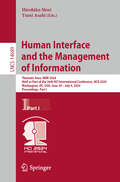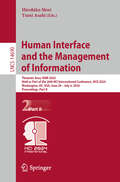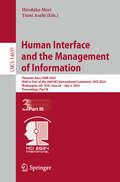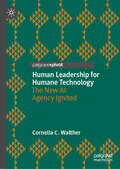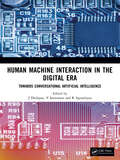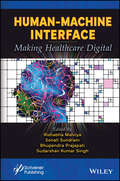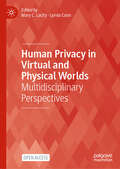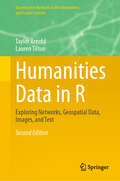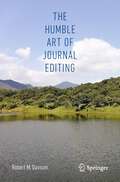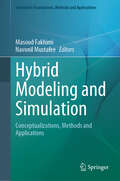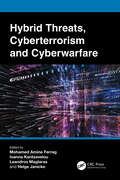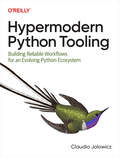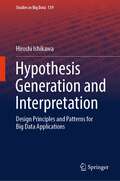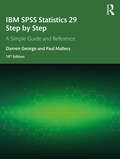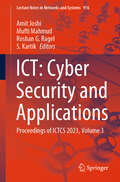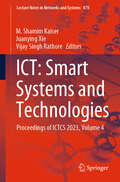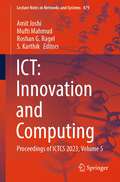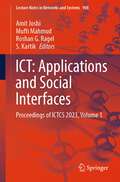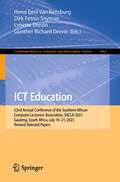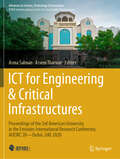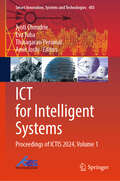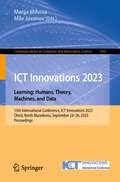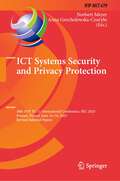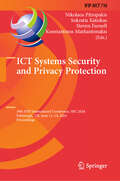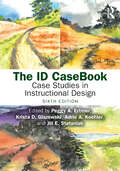- Table View
- List View
Human Interface and the Management of Information: Thematic Area, HIMI 2024, Held as Part of the 26th HCI International Conference, HCII 2024, Washington, DC, USA, June 29–July 4, 2024, Proceedings, Part I (Lecture Notes in Computer Science #14689)
by Hirohiko Mori Yumi AsahiThis three-volume set LNCS 14789-14791 constitutes the thoroughly refereed proceedings of the thematic area Human Interface and the Management of Information, HIMI 2024, held as part of the 26th International Conference on Human-Computer Interaction, HCI International 2024 (HCII 2024), was held as a hybrid event in Washington DC, USA, during June/July 2024. The total of 1271 papers and 309 posters included in the HCII 2023 proceedings was carefully reviewed and selected from 5108 submissions. The HIMI conference addressed approaches and objectives of information and data design, retrieval, presentation and visualization, management, and evaluation in human computer interaction in a variety of application domains, such as, for example, learning, work, decision, collaboration, medical support, and service engineering, and much more.
Human Interface and the Management of Information: Thematic Area, HIMI 2024, Held as Part of the 26th HCI International Conference, HCII 2024, Washington, DC, USA, June 29–July 4, 2024, Proceedings, Part II (Lecture Notes in Computer Science #14690)
by Hirohiko Mori Yumi AsahiThis three-volume set LNCS 14789-14791 constitutes the thoroughly refereed proceedings of the thematic area Human Interface and the Management of Information, HIMI 2024, held as part of the 26th International Conference on Human-Computer Interaction, HCI International 2024 (HCII 2024), was held as a hybrid event in Washington DC, USA, during June/July 2024. The total of 1271 papers and 309 posters included in the HCII 2023 proceedings was carefully reviewed and selected from 5108 submissions. The HIMI conference addressed approaches and objectives of information and data design, retrieval, presentation and visualization, management, and evaluation in human computer interaction in a variety of application domains, such as, for example, learning, work, decision, collaboration, medical support, and service engineering, and much more.
Human Interface and the Management of Information: Thematic Area, HIMI 2024, Held as Part of the 26th HCI International Conference, HCII 2024, Washington, DC, USA, June 29–July 4, 2024, Proceedings, Part III (Lecture Notes in Computer Science #14691)
by Hirohiko Mori Yumi AsahiThis three-volume set LNCS 14789-14791 constitutes the thoroughly refereed proceedings of the thematic area Human Interface and the Management of Information, HIMI 2024, held as part of the 26th International Conference on Human-Computer Interaction, HCI International 2024 (HCII 2024), was held as a hybrid event in Washington DC, USA, during June/July 2024. The total of 1271 papers and 309 posters included in the HCII 2023 proceedings was carefully reviewed and selected from 5108 submissions. The HIMI conference addressed approaches and objectives of information and data design, retrieval, presentation and visualization, management, and evaluation in human computer interaction in a variety of application domains, such as, for example, learning, work, decision, collaboration, medical support, and service engineering, and much more.
Human Leadership for Humane Technology: The New AI: Agency Ignited
by Cornelia C. WaltherThis book explores the relationship of natural and artificial intelligence in our rapidly evolving world. It does so anchored in an innovative multidisciplinary framework and the premise that society is a composition of multiple dimensions, with individuals (micro), communities (meso), countries (macro) and planet (meta) in the collective sphere, and individuals themselves as multidimensional beings (aspirations, emotions, thoughts, sensations). This perspective is applied to analyze the implications of our transition into a phase where online and offline realms are increasingly intertwined. Special attention is given to the influence of all pervasive technology on our perception of the self and society. The central message is that we must learn to harness Agency amid AI, which entails double literacy – of artificial and natural intelligence.
Human Machine Interaction in the Digital Era: Towards Conversational Artificial Intelligence
by J. Dhilipan V. Saravanan R. AgusthiyarThe Human Machine Interaction in the Digital Era (ICHMIDE) 2023 conference aims to address the main issues of concern in the design issues with a particular emphasis on the design and development of interfaces for autonomous robots. Its main objective is to provide an international forum for the dissemination and exchange of up-to-date scientific information on research related to integrated human/machine systems at multiple scales, and includes areas such as human/machine interaction, engineering mathematical models, assistive technologies, system modelling, design, testing and validation. The organization of ICHMS is based on the following Track types: Smart Applications for Digital Era, Computational Mathematical and Electronics, Intelligent Systems in Security and Communication Technologies, Technological Interventions using AI and Machine Learning, Applied Science, and IoT Techniques for Industries.
Human-Machine Interface: Making Healthcare Digital
by Rishabha Malviya Sonali Sundram Bhupendra Prajapati Sudarshan Kumar SinghHUMAN-MACHINE INTERFACE The book contains the latest advances in healthcare and presents them in the frame of the Human-Machine Interface (HMI). The Human-Machine Interface (HMI) industry has witnessed the evolution from a simple push button to a modern touch-screen display. HMI is a user interface that allows humans to operate controllers for machines, systems, or instruments. Most medical procedures are improved by HMI systems, from calling an ambulance to ensuring that a patient receives adequate treatment on time. This book describes the scenario of biomedical technologies in the context of the advanced HMI, with a focus on direct brain-computer connection. The book describes several HMI tools and related techniques for analyzing, creating, controlling, and upgrading healthcare delivery systems, and provides details regarding how advancements in technology, particularly HMI, ensure ethical and fair use in patient care. Audience The target audience for this book is medical personnel and policymakers in healthcare and pharmaceutical professionals, as well as engineers and researchers in computer science and artificial intelligence.
Human Privacy in Virtual and Physical Worlds: Multidisciplinary Perspectives (Technology, Work and Globalization)
by Mary C. Lacity Lynda CoonThis open-access book is premised on the belief that understanding and protecting privacy requires a multidisciplinary approach. The editors of this contributed book believe that privacy is a ‘wicked problem’ because of its social complexity. In the modern world, political, social, and technological structures increasingly violate human privacy in physical and virtual spaces. Our behaviors are surveilled, captured, and monetized—often without our knowledge. Contributors are experts from diverse fields, including anthropology, architecture, data science, engineering, history, information systems, library sciences, medicine, philosophy, and supply chain management, each writing for an explicitly interdisciplinary readership. Privacy as a concept is a moving target across the globe, morphing and transforming historically from one epoch to the next. By moving beyond the limitations of a single disciplinary lens, this book aims at a richer, more comprehensive, and more lasting analysis. This collection is of great interest to students and scholars of diverse backgrounds studying human privacy.
Humanities Data in R: Exploring Networks, Geospatial Data, Images, and Text (Quantitative Methods in the Humanities and Social Sciences)
by Taylor Arnold Lauren TiltonThis book teaches readers to integrate data analysis techniques into humanities research practices using the R programming language. Methods for general-purpose visualization and analysis are introduced first, followed by domain-specific techniques for working with networks, text, geospatial data, temporal data, and images. The book is designed to be a bridge between quantitative and qualitative methods, individual and collaborative work, and the humanities and social sciences. The second edition of the text is a significant revision, with almost every aspect of the text rewritten in some way. The most notable difference is the incorporation of new R packages such as ggplot2 and dplyr that center broad data-science concepts. This 2nd edition of Humanities Data with R does not presuppose background programming experience. Early chapters take readers from R set-up to exploratory data analysis, with one chapter dedicated to each stage of the data-science pipeline (data collection, visualization, manipulation, and relational joins). Following this, text analysis, networks, temporal data, geospatial data, and image analysis each have a dedicated chapter. These are grounded in examples to move readers beyond the intimidation of adding new tools to their research. The final section of the book extends the core material with additional computer science techniques for processing large datasets. Everything is hands-on: image analysis is explained using digitized photographs from the 1930s, and networks are applied to page links on Wikipedia. After working through these examples with the provided data, code and book website, readers are prepared to apply new methods to their own work. The open source R programming language, with its myriad packages and popularity within the sciences and social sciences, is particularly well-suited to working with humanities data. R packages are also highlighted in an appendix. The methodology will have wide application in classrooms and self-study for the humanities, but also for use in linguistics, anthropology, and political science. Outside the classroom, this intersection of humanities and computing is particularly relevant for research and new modes of dissemination across archives, museums and libraries.
The Humble Art of Journal Editing
by Robert M. DavisonThe publication of scholarly research is both a major driver of social progress and a significant industry in its own right. Scholarly research is the focus of attention for countless numbers of scholars globally and a key measure of scholarly excellence. Much has been written about the conduct of research that is designed to help scholars attain appropriate standards of rigor and relevance, and indeed craft their research outputs in ways appropriate for different venues, notably as journal articles, conference papers, book chapters, and books. However, although scholarly researchers fulfill roles other than as authors, for instance as journal reviewers and editors, there is a dearth of consolidated information about the nature of editorial work. Drawing on over two decades of experience in editing scholarly journals, the author offers a more systematic guide to scholarly journal editing.The book begins with an introduction to the art of scholarly journal editing,the nature of that art (Chapter 1), and an examination of editorial promulgation of cultural values of scholarly journals with an emphasis on responsible research (Chapter 2). Chapter 3 examines the many issues associated with sourcing content, and opines on the novelty, breadth, and depth of research, including discussions of indigenous theorization, serendipity, iconoclastic research, and the value of special issues. Chapter 4 deals with the review process and offers advice for formulating effective reviewer guidelines that lead to constructive and developmental advice for authors. The next two chapters discuss the audience of the journal as well as publisher relations. Finally, the book is concluded with thoughts and recommendations about emerging challenges, such as the ethics of AI tools (like ChatGPT), predatory journals, and the open-access movement.Offering a practical guide to editing scholarly journals, this book will be a key resource for scholars making the leap from researcher to editor, regardless of discipline.
Hybrid Modeling and Simulation: Conceptualizations, Methods and Applications (Simulation Foundations, Methods and Applications)
by Navonil Mustafee Masoud FakhimiThe unique book advances understanding of modelling complex systems using hybrid approaches that combine discrete-event, agent-based, and system dynamic simulations with research approaches and artefacts from other scientific disciplines. As systems become increasingly large and complex, it is a challenge to capture the intricacies of the underlying system and offer novel forms of analysis using only models that employ a single simulation technique. The book underscores the importance of both hybrid simulation (employing techniques primarily developed in the field of modelling and simulation) and hybrid modelling (incorporating simulation with methods from wider disciplines such as applied computing, data science, engineering, and soft/qualitative operations research). Furthermore, the text aims to inspire further research and practice, fostering the growth of cross-disciplinary hybrid models. Topics and features: Provides a comprehensive overview of hybrid modelling and simulation, including methodological extensions and novel applications Features case studies and examples demonstrating the synergy realized by applying hybrid methods Calls for innovation and growth of the discipline by incorporating diverse scientific perspectives Encourages adoption of interdisciplinary methods to engender improved insights from simulation studies Promotes interdisciplinary collaboration, pushing modelling and simulation into new research and application areas This comprehensive volume will appeal to researchers, academics, students, and practitioners who seek to advance their modelling and simulation work. The book also will serve as a reference, informing research communities of the potential of hybrid models that combine simulation with disciplinary research artefacts, methods, and approaches.
Hybrid Threats, Cyberterrorism and Cyberwarfare
by Mohamed Amine Ferrag Ioanna Kantzavelou Leandros Maglaras Helge JanickeNowadays, in Cyberspace there is a burst of information that everyone has access. However, apart from the advantages the Internet offers, it also hides numerous dangers for both people and nations. Cyberspace has a dark side, including terrorism, bullying, and other types of violence. Cyberwarfare is a kind of virtual war that causes the same destruction that a physical war would also do. A hybrid threat is an umbrella term, encompassing a wide variety of existing adverse circumstances and actions, such as terrorism, migration, piracy, corruption, ethnic conflict etc and is not exclusively a tool of asymmetric or non-state actors, but can be applied by state and non-state actors alike. ‘Cyber-conflict’ and ‘cyber-war’ serve as examples of the use of new technologies within the scope of hybrid threats. Cyber-war basically refers to a sustained computer-based cyber-attack by a state against the IT infrastructure of a target state. On the other hand cyber-security is a major factor that shapes productivity and efficiency of the modern industry in both technical and economic terms. The book discusses and analyses current posture of cyberterrorism, cyberwarfare, and hybrid threats, sector specific cyber-attacks that have the form of cyberterrorism and presents the recent actions that EU, USA and other Nations have taken in order to strengthen their systems against such attacks. There has never been a higher risk of a major catastrophe as a result of the rise in offensive cyber activity, particularly the possibility of cyber-physical strikes against critical services. Recent cyber-attacks against critical infrastructures along with the continuous migration crisis have been the main driving forces that led to the decision to publish this book.
Hypermodern Python Tooling: Building Reliable Workflows For An Evolving Python Ecosystem
by Claudio JolowiczKeeping up with the Python ecosystem can be daunting. Its developer tooling doesn't provide the out-of-the-box experience native to languages like Rust and Go. When it comes to long-term project maintenance or collaborating with others, every Python project faces the same problem: how to build reliable workflows beyond local development while staying in sync with the evolving ecosystem.With this hands-on guide, Python developers will learn how to forge the moving parts of a Python project into an easy-to-use toolchain, using state-of-the-art tools including Poetry, Nox, pytest, mypy, pre-commit, Black, Ruff, uv, Rye, Hatch, and more. Author Claudio Jolowicz shows you how to create robust Python project structures complete with unit tests, static analysis, code formatting, and type checking.You'll learn how to:Create open source projects with state-of-the-art infrastructureBuild a custom infrastructure for all Python projects in a company or teamImprove and modernize the infrastructure of an existing Python projectEvaluate modern Python tooling for adoption in existing projectsUse tools for packaging and dependency managementAutomate common development tasks such as testing, dependency updates, and publishing releases
Hypothesis Generation and Interpretation: Design Principles and Patterns for Big Data Applications (Studies in Big Data #139)
by Hiroshi IshikawaThis book focuses in detail on data science and data analysis and emphasizes the importance of data engineering and data management in the design of big data applications. The author uses patterns discovered in a collection of big data applications to provide design principles for hypothesis generation, integrating big data processing and management, machine learning and data mining techniques. The book proposes and explains innovative principles for interpreting hypotheses by integrating micro-explanations (those based on the explanation of analytical models and individual decisions within them) with macro-explanations (those based on applied processes and model generation). Practical case studies are used to demonstrate how hypothesis-generation and -interpretation technologies work. These are based on “social infrastructure” applications like in-bound tourism, disaster management, lunar and planetary exploration, and treatment of infectious diseases. The novel methods and technologies proposed in Hypothesis Generation and Interpretation are supported by the incorporation of historical perspectives on science and an emphasis on the origin and development of the ideas behind their design principles and patterns. Academic investigators and practitioners working on the further development and application of hypothesis generation and interpretation in big data computing, with backgrounds in data science and engineering, or the study of problem solving and scientific methods or who employ those ideas in fields like machine learning will find this book of considerable interest.
IBM SPSS Statistics 29 Step by Step: A Simple Guide and Reference
by Darren George Paul MalleryIBM SPSS Statistics 29 Step by Step: A Simple Guide and Reference, eighteenth edition, takes a straightforward, step-by-step approach that makes SPSS software clear to beginners and experienced researchers alike.Extensive use of four-color screen shots, clear writing, and step-by-step boxes guide readers through the program. Output for each procedure is explained and illustrated, and every output term is defined. Exercises at the end of each chapter support students by providing additional opportunities to practice using SPSS. This book covers the basics of statistical analysis and addresses more advanced topics such as multidimensional scaling, factor analysis, discriminant analysis, measures of internal consistency, MANOVA (between- and within-subjects), cluster analysis, Log-linear models, logistic regression, and a chapter describing residuals. New to this edition is a new chapter on meta-analysis that describes new SPSS procedures for analyzing effect sizes across studies, and the content has been thoroughly updated in line with the latest version of the SPSS software, SPSS 29. The end sections include a description of data files used in exercises, an exhaustive glossary, suggestions for further reading, and a comprehensive index.Accompanied by updated online instructor’s materials and website data files, this is an essential resource for instructors and students needing a guide to using SPSS in their work, across the social sciences, behavioural sciences, education, and beyond.
ICT: Proceedings of ICTCS 2023, Volume 3 (Lecture Notes in Networks and Systems #916)
by Amit Joshi Mufti Mahmud Roshan G. Ragel S. KartikThis book contains best selected research papers presented at ICTCS 2023: Eighth International Conference on Information and Communication Technology for Competitive Strategies. The conference will be held in Jaipur, India during 8 – 9 December 2023. The book covers state-of-the-art as well as emerging topics pertaining to ICT and effective strategies for its implementation for engineering and managerial applications. This book contains papers mainly focused on ICT for computation, algorithms and data analytics and IT security. The work is presented in three volumes.
ICT: Proceedings of ICTCS 2023, Volume 4 (Lecture Notes in Networks and Systems #878)
by M. Shamim Kaiser Juanying Xie Vijay Singh RathoreThis book contains best selected research papers presented at ICTCS 2023: Eighth International Conference on Information and Communication Technology for Competitive Strategies. The conference will be held in Jaipur, India during 8 – 9 December 2023. The book covers state-of-the-art as well as emerging topics pertaining to ICT and effective strategies for its implementation for engineering and managerial applications. This book contains papers mainly focused on ICT for computation, algorithms and data analytics and IT security. The work is presented in five volumes.
ICT: Proceedings of ICTCS 2023, Volume 5 (Lecture Notes in Networks and Systems #879)
by Amit Joshi Mufti Mahmud Roshan G. Ragel S. KarthikThis book contains best selected research papers presented at ICTCS 2023: Eighth International Conference on Information and Communication Technology for Competitive Strategies. The conference will be held in Jaipur, India during 8 – 9 December 2023. The book covers state-of-the-art as well as emerging topics pertaining to ICT and effective strategies for its implementation for engineering and managerial applications. This book contains papers mainly focused on ICT for computation, algorithms and data analytics and IT security. The work is presented in five volumes.
ICT: Proceedings of ICTCS 2023, Volume 1 (Lecture Notes in Networks and Systems #908)
by Amit Joshi Mufti Mahmud Roshan G. Ragel S. KartikThis book contains best selected research papers presented at ICTCS 2023: Eighth International Conference on Information and Communication Technology for Competitive Strategies. The conference will be held in Jaipur, India during 8 – 9 December 2023. The book covers state-of-the-art as well as emerging topics pertaining to ICT and effective strategies for its implementation for engineering and managerial applications. This book contains papers mainly focused on ICT for computation, algorithms and data analytics and IT security. The work is presented in five volumes
ICT Education: 52nd Annual Conference of the Southern African Computer Lecturers' Association, SACLA 2023, Gauteng, South Africa, July 19–21, 2023, Revised Selected Papers (Communications in Computer and Information Science #1862)
by Henri Emil Van Rensburg Dirk Petrus Snyman Lynette Drevin Günther Richard DrevinThis book constitutes the refereed proceedings of the 52nd Annual Conference of the Southern African Computer Lecturers' Association on ICT Education, SACLA 2023, held in Gauteng, South Africa, during July 19–21, 2023. The 12 full papers included in this book were carefully reviewed and selected from 42 submissions. They were organized in topical sections as follows: student centered teaching and learning; AI and future movements; programming; and beyond the classroom.
ICT for Engineering & Critical Infrastructures: Proceedings of the 3rd American University in the Emirates International Research Conference, AUEIRC'20—Dubai, UAE 2020 (Advances in Science, Technology & Innovation)
by Asma Salman Assem TharwatThis book—consisting of four parts—brings forth a comprehensive evaluation of information and communication technologies (ICTs) utilization in engineering and infrastructures. The field of engineering has consistently been a bastion of problem-solving and innovation. It has continuously aided humanity in conquering seemingly unsolvable obstacles by pushing the limits of human capability and ingenuity. In the modern age, modern computational methods and digital systems present themselves as the frontier of novel technological innovation, thus attaining the potential to considerably strengthen various engineering fields. Tackling essential topics such as the incorporation of informatics in infrastructure, cybersecurity, advanced networking techniques, and smart resource management, this book peers into the future of engineering, proving as an excellent resource for engineers, entrepreneurs, policymakers, network specialists, and finally, computer scientists.
ICT for Intelligent Systems: Proceedings of ICTIS 2024, Volume 1 (Smart Innovation, Systems and Technologies #403)
by Amit Joshi Jyoti Choudrie Thinagaran Perumal Eva TubaThis book gathers papers addressing state-of-the-art research in all areas of information and communication technologies and their applications in intelligent computing, cloud storage, data mining, and software analysis. It presents the outcomes of the 8th International Conference on Information and Communication Technology for Intelligent Systems (ICTIS 2024), held in Las Vegas, USA. The book is divided into six volumes. It discusses the fundamentals of various data analysis techniques and algorithms, making it a valuable resource for researchers and practitioners alike.
ICT Innovations 2023. Learning: 15th International Conference, ICT Innovations 2023, Ohrid, North Macedonia, September 24–26, 2023, Proceedings (Communications in Computer and Information Science #1991)
by Marija Mihova Mile JovanovThis book constitutes the refereed proceedings of the 15th International Conference on ICT Innovations 2023. Learning: Humans, Theory, Machines, and Data, ICT Innovations 2023, held in Ohrid, North Macedonia during September 24–26, 2023.The 17 full papers included in this book were carefully reviewed and selected from 52 submissions. They are organized in sections by topics as follows: AI and natural language processing; bioinformatics; dew computing; e-learning and e-services; image processing; network science; theoretical informatics.
ICT Systems Security and Privacy Protection: 38th IFIP TC 11 International Conference, SEC 2023, Poznan, Poland, June 14–16, 2023, Revised Selected Papers (IFIP Advances in Information and Communication Technology #679)
by Norbert Meyer Anna Grocholewska-CzuryłoThis book constitutes the refereed proceedings of the 38th IFIP TC 11 International Conference on Information Security and Privacy Protection, SEC 2023, held in Poznan, Poland, in June 2023. The 26 full papers included in this book were carefully reviewed and selected from 84 submissions. They focus on topics such as access control and authentication; applied cryptography; mobile security; side-channel attacks; trust management, digital forensics; industry networks security, etc.
ICT Systems Security and Privacy Protection: 39th IFIP International Conference, SEC 2024, Edinburgh, UK, June 12–14, 2024, Proceedings (IFIP Advances in Information and Communication Technology #710)
by Steven Furnell Sokratis Katsikas Konstantinos Markantonakis Nikolaos PitropakisThis book constitutes the proceedings of the 39th IFIP International Conference on ICT Systems Security and Privacy Protection, SEC 2024, held in Edinburgh, UK, during June 12–14, 2024. The 34 full papers presented were carefully reviewed and selected from 112 submissions. The conference focused on current and future IT Security and Privacy Challenges and also was a part of a series of well-established international conferences on Security and Privacy.
The ID CaseBook: Case Studies in Instructional Design
by Peggy A. Ertmer Krista D. Glazewski Jill E. Stefaniak Adrie A. KoehlerThe ID CaseBook provides instructional design students with 25 realistic, open-ended case studies that encourage adept problem-solving across a variety of client types and through all stages of the process. After an introduction to the technique of case-based reasoning, the book offers four sections dedicated to K–12, informal learning, post-secondary, and industry clients, respectively, each comprising varied, detailed cases created by instructional design experts. All cases, alongside their accompanying discussion questions, encourage students to analyze the available information, develop action plans, and consider alternative possibilities in resolving problems. This revised and updated sixth edition attends to the profound impacts that public health crises; urgent access, equity, and inclusion needs among diverse learners; and a rapidly expanded reliance on digital learning formats have had on the design of learning today.
